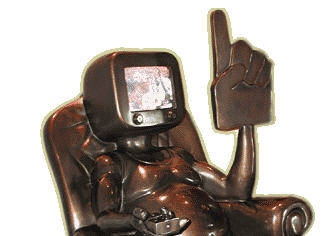Saturday, April 29, 2006
darkness visible
"While the bourgeois household was reluctant to admit gas because of its unpleasant smell and its poisonous, explosive nature, all doors were immediately opened to electric light. 'The Edison light is penetrating not only into rooms that are at present lit by gas, but even into those that are closed to it - that is, elegant apartments and drawing-rooms - and chandeliers and candelabra.' It was electricity's properties as a pure, odourless and non-physical form of energy that made it immediately acceptable in drawing rooms.
"...An analogy between electrical power and finance capital springs to mind. The concentration and centralisation of energy in high-capacity power stations corresponded to the concentration of economic power in big banks." Schivelbusch, Disenchanted Night via
"...An analogy between electrical power and finance capital springs to mind. The concentration and centralisation of energy in high-capacity power stations corresponded to the concentration of economic power in big banks." Schivelbusch, Disenchanted Night via
. . . . . . .
Fashion, like architecture, inheres in the darkness of the lived moment, belongs to the dream consciousness of the collective. The latter awakes, for example, in advertising. Walter Benjamin, Arcades.
Wednesday, April 26, 2006
Tuesday, April 18, 2006
Plutarch on guilds as lump diminishers

But of all his measures the most commended was his distribution of the people by their trades into companies or guilds; for as the city consisted, or rather did not consist of, but was divided into, two different tribes, the diversity between which could not be effaced and in the mean time prevented all unity and caused perpetual tumult and ill-blood, reflecting how hard substances that do not readily mix when in the lump may, by being beaten into powder, in that minute form be combined, he resolved to divide the whole population into a number of small divisions, and thus hoped, by introducing other distinctions, to obliterate the original and great distinction, which would be lost among the smaller. So, distinguishing the whole people by the several arts and trades, he formed the companies of musicians, goldsmiths, carpenters, dyers, shoemakers, skinners, braziers, and potters; and all other handicraftsmen he composed and reduced into a single company, appointing every one their proper courts, councils, and religious observances. In this manner all factious distinctions began, for the first time, to pass out of use, no person any longer being either thought of or spoken of under the notion of a Sabine or a Roman, a Romulian or a Tatian; and the new division became a source of general harmony and intermixture. Life of Numa Pompilius
Thursday, April 13, 2006
Tuesday, April 11, 2006
Objective Bill
Talk to the Newsroom:
Executive Editor Bill Keller
Bill Keller, executive editor of The Times, is answering questions in this space about the newspaper and the news. Questions will be selected from e-mails sent to asktheeditors@nytimes.com, and Mr. Keller will answer as many this week as time permits. Afterward, these discussions will continue with other Times editors.
In my current job it's important that I endeavor to keep my opinions to myself and out of the paper.
Is it conceivable that someone of this persuasion could be led to understand that it is possible for rational adults to have a different view of this? It's a little bit like someone saying (to Freud) "In my current psychoanalytic state, it's important that I endeavor to keep my dick out of my dreams."
Executive Editor Bill Keller
Bill Keller, executive editor of The Times, is answering questions in this space about the newspaper and the news. Questions will be selected from e-mails sent to asktheeditors@nytimes.com, and Mr. Keller will answer as many this week as time permits. Afterward, these discussions will continue with other Times editors.
Oh goody. I sent my question to Bill more than 24 hours ago:Apparently Bill Keller hasn't yet had time to address it. He's answered some other good questions, though. Including this in response to a question about his political sensibility:
Mr. Keller:
Given the growing public awareness that journalistic objectivity is primarily an (indefensible) marketing ploy, context and connectedness have become salient aspects of any media entity. Your prominent position at the New York Times and your newsworthy role (writing, editing, doing public damage control) with regard to recent stories involving big-picture elements of the Iraq debacle make your personal background a legitimate subject of inquiry and curiosity for Times readers. Yet these readers, already concerned at the compromised nature of Ms. Miller's relationship with the government, were to my knowledge never informed that your father is a former Chairman and CEO of Chevron. What can you tell us about your thinking with regard to the non-disclosure of arguably relevant background information on yourself? Such information is routinely given about other public figures. Why not let readers judge the relevance for themselves?
In my current job it's important that I endeavor to keep my opinions to myself and out of the paper.
Is it conceivable that someone of this persuasion could be led to understand that it is possible for rational adults to have a different view of this? It's a little bit like someone saying (to Freud) "In my current psychoanalytic state, it's important that I endeavor to keep my dick out of my dreams."
Thursday, April 06, 2006
I entirely see his point
Brian Grover, a 39-year-old truck driver from New Mexico, was familiar with Tibetan chanting and other offbeat musical forms. But nothing had grabbed him like throat-singing. He now performs the Tuvan art monthly with fellow enthusiasts in Albuquerque, and says he plans to move to Tuva with his wife and three young children within the next year or so. WSJ
Wednesday, April 05, 2006
Dept. of re, -turns, -urns, -runs

There has been a rumor in recent years to the effect that I have become less opposed to religious orthodoxy than I formerly was. This rumor is totally without foundation. I think all the great religions of the world – Buddhism, Hinduism, Christianity, Islam, and Communism – both untrue and harmful. It is evident as a matter of logic that, since they disagree, not more than one of them can be true. With very few exceptions, the religion which a man accepts is that of the community in which he lives, which makes it obvious that the influence of environment is what has led him to accept the religion in question. It is true that the Scholastics invented what professed to be logical arguments proving the existence of God, and that these arguments, or others of a similar tenor, have been accepted by many eminent philosophers, but the logic to which these traditional arguments appealed is of an antiquated Aristotelian sort which is now rejected by practically all logicians except such as are Catholics. There is one of these arguments which is not purely logical. I mean the argument from design. This argument, however, was destroyed by Darwin; and, in any case, could only be made logically respectable at the cost of abandoning God’s omnipotence. Apart from logical cogency, there is to me something a little odd about the ethical valuations of those who think that an omnipotent, omniscient, and benevolent Deity, after preparing the ground by many millions of years of lifeless nebulae, would consider Himself adequately rewarded by the final emergence of Hitler and Stalin and the H-bomb.
===Bertrand Russell, 1957 Preface to 1927 essay, Why I Am Not a Christian. The complete essay is online in several places.
Touchstones. All returns, the argument doesn't change, no matter how networked, here's a network via BMO, the same lineaments again, riverrun past eve, again. Good t-shirts might help:





